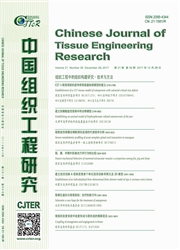

 中文摘要:
中文摘要:
背景:不同的力学刺激可以对软骨细胞的代谢水平产生影响,但其作用方式不明。目的:研究在压应力和拉应力作用条件下,参与软骨细胞分解与合成代谢基因表达水平的变化。方法:提取2周龄SD大鼠的关节软骨细胞,对原代软骨细胞进行鉴定。第1代软骨细胞施加应变量为3%和7%的循环拉应力和循环压应力,测定关节软骨细胞相关基因的改变。结果与结论:当3%的循环拉应力作用于软骨细胞时,其合成代谢基因Ⅰ、Ⅱ型胶原,蛋白多糖m RNA表达水平均降低;在3%的循环压应力下,蛋白多糖m RNA表达水平升高,Ⅰ型胶原mR NA表达水平降低(P〈0.001),分解代谢基因基质金属蛋白酶13 mR NA表达水平下降(P〈0.01);而当应变量达到7%时,循环拉应力和压应力会导致合成代谢相关基因普遍下降,前者还会使分解代谢基因基质金属蛋白酶13 m RNA表达水平升高(P〈0.05)。3%的循环压缩比3%的循环拉伸使细胞骨架更趋向卵圆形。提示在体外,适当的循环压应力有利于维持大鼠关节软骨细胞的生长特性,而小幅度的拉应力即可降低软骨细胞的合成能力,而应力的作用可能是通过改变细胞骨架引起的。
 英文摘要:
英文摘要:
BACKGROUND: Different mechanical stimulations may have an effect on the level of metabolism of chondrocytes, but the effect is not clear.OBJECTIVE: To investigate expression level changes in metabolic genes that participate in cartilage cell decomposition and synthesis under compressive stress and tensile stress conditions. METHODS: We obtained articular chondrocytes from 2-week-old Sprague-Dawley rats. Primary cultured chondrocytes were identified. Passage one chondrocytes received cyclic tensile stress and cyclic compressive stress of 3% and 7%, respectively, so as to measure articular changes in chondrocytes-related genes. RESULTS AND CONCLUSION: When chondrocytes were subjected to cyclic tensile stress of 3%, synthetic metabolic gene collagen types I and II and proteoglycan m RNA expression levels were decreased. If 3% cyclic compressive stress was applied, proteoglycan m RNA expression levels were increased, and type I collagen m RNA expression levels were decreased(P〈0.001), and matrix metalloproteinase-13 m RNA expression levels were reduced(P〈0.01). When strain reached 7%, cyclic tensile stress and compressive stress could lead to a general decrease in anabolism-related genes. The former could also make matrix metalloproteinase-13 m RNA expression levels increased(P〈0.05). 3% cyclic compression ratio and 3% cyclic stretch made cytoskeleton become oval. These results indicated that in vitro, proper cyclic compressive stress is beneficial to maintain the growth characteristics of articular chondrocytes in rats. Small tensile stress can decrease the synthesis ability of chondrocytes. The effect of stress may be caused by changing the cytoskeleton.
 同期刊论文项目
同期刊论文项目
 同项目期刊论文
同项目期刊论文
 期刊信息
期刊信息
